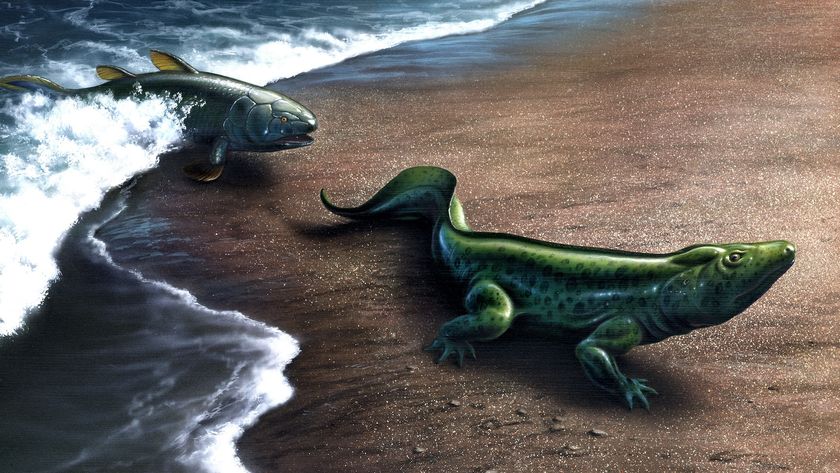Attacks Mount on Teaching of Evolution

The anti-evolution crowd has come out swinging this year. So far the theory has not taken one on the chin, but that could change soon in Tennessee.
The pounding is coming not from scientists, but from politicians who would chip away at the solid theory's foundations in an effort to interject religion into the teaching of science in public schools.
So far this year, seven states have proposed bills that would weaken evolution's standing in the classroom. The legislation is often couched as supporting academic freedom, points out the National Center for Science Education (NCSE), a group that defends the teaching of evolution in public schools. But critics say each bill has been, in fact, an attempt to foster the false belief among students that evolution is "just a theory" with "significant holes" that is wide open to competing ideas. And those competing ideas favor a deity. [See What’s a Theory? & How Evolution Works]
"In an era when biology education is increasingly critical to industry and to an informed citizenry, this sort of law is especially dangerous," said Josh Rosenau, a biologist and programs and policy director at the NCSE.
Trouble in Tennessee
The latest anti-evolution legislation advanced last week when the Tennessee House of Representatives passed a bill by a vote of 70-28 that encourages teachers to question the theory of evolution, as well as the science of global warming, in science classes.
But the ideas proposed as alternatives to evolution — creationism and intelligent design— are not science. Creationism is religion. Intelligent design is just plain sneaky: It is rooted in religion but couched in pseudoscience with enough scientific-sounding mumbo-jumbo to confuse a kid into thinking there just might be something to it.
Sign up for the Live Science daily newsletter now
Get the world’s most fascinating discoveries delivered straight to your inbox.
Neither has any place in a science curriculum, scientists overwhelmingly agree.
"A clear understanding of biology is critical to careers in biotechnology, and to being an informed patient in a doctor's office," Rosenau told LiveScience. "Bills like this will confuse students in what may be their last science class."
Likewise, the vast majority of climate scientists see zero controversy on the data showing that the planet is warming.
The Tennessee bill, HB 368, states that "the teaching of some scientific subjects, including, but not limited to, biological evolution, the chemical origins of life, global warming, and human cloning, can cause controversy," and the legislation would protect teachers from discipline if they "help students understand, analyze, critique, and review in an objective manner the scientific strengths and scientific weaknesses of existing scientific theories."
That all sounds great, if there were indeed controversy that needed teaching.
"There is virtually no scientific controversy among the overwhelming majority of researchers on the core facts of global warming and evolution," said Alan I. Leshner, the chief executive officer of the American Association for the Advancement of Science, which publishes the leading journal Science. "Asserting that there are significant scientific controversies about the overall nature of these concepts, when there are none, will only confuse students, not enlighten them," Leshner wrote March 2 in a letter to the House education subcommittee.
Widespread disbelief
In a study earlier this year that might surprise many scientists, 13 percent of biology teachers in the United States were found to advocate teaching creationism in the classroom. The survey also revealed that a majority of high school biology teachers in this country wimp out when it comes to taking a solid position on evolution in the classroom — but mostly to avoid conflicts, they say.
Tennessee teachers tend to think HB 368 is a lousy bill.
According to the National Center for Science Education, the Tennessee Science Teachers Association, which represents the supposed beneficiaries of the bill, characterizes it as "unnecessary, anti-scientific, and very likely unconstitutional."
"I wish I knew why politicians were substituting their judgment for that of classroom teachers," said Rosenau, who follows anti-evolution legislation closely and has testified before school boards and met with legislators. "Teachers and scientists got together and evaluated the science in preparing Tennessee's state science standards, but the legislature is now second-guessing that effort. No high school teachers or administrators have spoken out for this bill, while a biology teacher at the top science high school in Tennessee has twice testified against it."
A similar bill is likely to be voted on in the Tennessee Senate later this month, and some expect the governor to sign the ultimate legislation.
"It's looking increasingly likely that the Tennessee bill will become law," Rosenau said. "Concerned parents and teachers and scientists in Tennessee are still fighting to stop it, but so far the legislators supporting the bill have not been responsive to their constituents' concerns."
Mutate and spread
Other anti-evolution bills have been introduced this year in Florida (in committee), Texas (in committee), Missouri (has not advanced), Kentucky (dead), Oklahoma (dead) and New Mexico (dead).
History suggests that what happens in Tennessee doesn't stay in Tennessee.
"There's no doubt that this bill's passage would encourage other states to pass similarly misguided laws," Rosenau said.
He points out that after Tennessee passed the first “monkey” bill in the 1920s — which led to biology teacher John Scopes being fined $100 for teaching evolution to high-school students—dozens of other states went on to consider the same sorts of laws, "with one such law staying on the books in Arkansas until the 1960s, when the Supreme Court finally struck it down," Rosenau said.
Robert is an independent health and science journalist and writer based in Phoenix, Arizona. He is a former editor-in-chief of Live Science with over 20 years of experience as a reporter and editor. He has worked on websites such as Space.com and Tom's Guide, and is a contributor on Medium, covering how we age and how to optimize the mind and body through time. He has a journalism degree from Humboldt State University in California.












